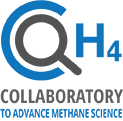Methane Emissions Collaboratory Awards Funding to Colorado State University to Improve Accuracy of Methane Emissions Estimations
05/04/23 Des Plaines, IL
Today the Collaboratory to Advance Methane Science (CAMS), an industry-led research consortium administered by GTI Energy with members from Chevron, Cheniere, ExxonMobil, Pioneer, Sempra Infrastructure, and Williams, announced a $352,000 award to Colorado State University (CSU) to improve the accuracy and understanding of methane emissions estimation models in oil and gas production basins.
The CSU project, titled “In depth Investigation of Top-Down and Bottom-Up Reconciliation: Data, Methods, and Quality Control”, will be led by Daniel Zimmerle, director of the CSU Energy Institute’s Methane Emissions Program and Kenneth Davis and Natasha Miles from Pennsylvania State University (PSU). The project will merge expertise from CSU’s Energy Institute and Methane Emissions Technology Evaluation Center with PSU’s Department of Meteorology and Atmospheric Science. Daniel Varon and Daniel Jacob, experts in satellite observations at Harvard University, will support the project.
There are currently two common industry methods for estimating methane emissions: Top-down methods use long or short-duration emissions data from aircraft, satellite, and tower-based networks of methane sensors to estimate the frequency and duration of leaks. Bottom-up methods calculate emissions using emission factors and asset inventories. By conducting thorough investigations into top-down and bottom-up methods, the project team intends to bring the industry closer to reconciling the gap found between these two methods.
The team will perform a series of modeling experiments using data from the Environmental Defense Fund’s Permian Basin study combined with a detailed data set developed through a Denver-Julesburg basin project facilitated by CSU and the University of Wyoming. By comparing the results to data derived from aerial surveys, satellites, and tower-based network technologies, the team aims to uncover and address the discrepancies in methane emission estimates and make recommendations for additional data that is likely to improve methods for high quality comparison.
About the Collaboratory to Advance Methane Science
CAMS is an industry-led collaborative research consortium working to advance methane-related science to better understand global methane emissions and the need for additional solutions. CAMS pursues scientific studies addressing methane emissions from all sectors along the entire natural gas value chain, from production to end use, in basins across the country. Studies focus on detection, measurement, and quantification of methane emissions with the goal of finding opportunities for reduction.
About GTI Energy
GTI Energy is a leading research and training organization. Our trusted team works to scale impactful solutions that shape energy transitions by leveraging gases, liquids, infrastructure, and efficiency. We embrace systems thinking, open learning, and collaboration to develop, scale, and deploy the technologies needed for low-carbon, low-cost energy systems.

